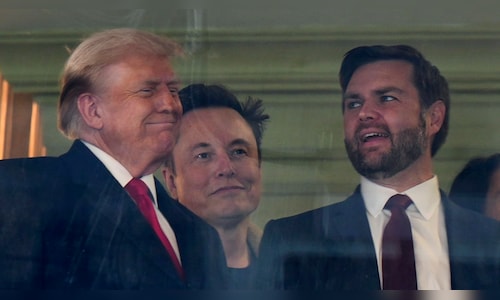
![]()
The tech world’s romance with H-1B visas isn’t hard to understand. Silicon Valley’s biggest names — from Google to Microsoft — have built their empires on the backs of brilliant minds from across the globe. Software wizards, engineering virtuosos, research pioneers — they’ve all found their way to American innovation hubs through this golden ticket of skilled immigration.
But here’s where it gets interesting. Trump’s newfound love for H-1B has sparked what might be the Republican Party’s deepest identity crisis. On one side, you have suit-wearing business conservatives nodding approvingly at their Bloomberg terminals. On the other, MAGA die-hards are waving their red caps in protest. The stakes? The soul of American immigration policy.
The battle lines are drawn, and Trump finds himself in an unusual position — trying to please both billionaire tech moguls who fund campaigns and the base that fills his rallies. It’s a bit like trying to square a circle.
Also read: Elon Musk and Trump reignite H-1B visa reform debate, call for major changes
Trump’s dance with H-1B visas
The numbers tell quite a story. Trump’s presidency saw H-1B denial rates shoot up to 24% in 2018, a stark contrast to the Obama era’s modest 5-8%. His ‘Buy American, Hire American’ executive order in 2017 sent shivers through Silicon Valley’s corridors. Yet here we are, watching the same man declare, “I’ve been a believer in H-1B. I have used it many times. It’s a great programme.”
| Previous administrations’ H1-B visa track record | ||
| President (Years) | H1-B approvals | H1-B approval rate |
| Bill Clinton (1993-1997) | 2.3 million | 96% |
| Bill Clinton (1997-2001) | 3.6 million | 95% |
| George W Bush (2001-2005) | 6.5 million | 95% |
| George W Bush (2005-2009) | 2.6 million | 92% |
| Barack Obama (2009-2013) | 4.3 million | 95.9% |
| Barack Obama (2013-2017) | 6.7 million | 88% |
| Donald Trump (2017-2021) | 6.7 million | 85% |
| Joe Biden (2021-2023*) | 5.3 million | 98% |
What changed? The answer lies partly in Trump’s new tech-savvy inner circle. His recent appointments read like a Silicon Valley who’s who:
- Sriram Krishnan steering AI strategy.
- David Sacks taking charge of cryptocurrency.
- Elon Musk lending his considerable influence.
Speaking of Musk — the Tesla CEO knows the H-1B story firsthand, having once held the visa himself. His company’s appetite for global talent speaks volumes — 724 H-1B visas this year alone.
The MAGA base, though, isn’t taking this pivot quietly. Steve Bannon, Trump’s former right-hand man, hasn’t minced words, blasting “big tech oligarchs” for their H-1B advocacy. The pot really started boiling when Trump suggested American universities’ international graduates “should be able to stay in this country.”
Trump’s team now faces a delicate balancing act. Tech leaders paint H-1B as America’s secret weapon in the global innovation race. The programme’s demographics tell their own tale — 72% of recipients are Indian professionals, a fact that’s music to Silicon Valley’s ears but sounds alarm bells among immigration hardliners.
The man who rode to power on ‘America First’ now finds himself championing a programme that brings the world’s talent to American shores. Politics, as they say, makes for strange bedfellows.
The Republican Party’s tech tussle
The Republican Party’s unity faces its greatest test since January 6, 2021. Sriram Krishnan’s appointment as AI adviser has sparked what might be the most fascinating ideological showdown in American politics.
Picture two camps squaring off in an increasingly heated battle:
- The MAGA purists: Laura Loomer and Steve Bannon lead the charge, painting H-1B as the villain in their ‘American jobs first’ narrative
- The tech evangelists: Elon Musk and Vivek Ramaswamy stand their ground, arguing America’s tech supremacy hangs in the balance
But here’s where it gets spicy. Ramaswamy dropped what felt like a cultural bomb, suggesting American society has “venerated mediocrity over excellence for way too long.”
The reason top tech companies often hire foreign-born & first-generation engineers over “native” Americans isn’t because of an innate American IQ deficit (a lazy & wrong explanation). A key part of it comes down to the c-word: culture. Tough questions demand tough answers & if…
— Vivek Ramaswamy (@VivekGRamaswamy) December 26, 2024
His jab at “jocks and prom queens over perceived nerds” set social media ablaze.
The Woodstock generation managed to build out aerospace, the one before went to the moon, America was doing great. Underlying your post is that we were all living in squalor until being rescued by H-1B’s. Then why did everyone want to come here?
— Cernovich (@Cernovich) December 26, 2024
“You’re being replaced in your own country because your culture is inferior to India’s.” -Vivek
All the stories of nepotism by Indian hiring managers are becoming clear— Tech Worker USA (@TechWorkerUSA) December 26, 2024
Musk, never one to mince words, warns of a looming “MAGA civil war.” The party finds itself caught between its nationalist heart and its capitalist head. Adding fuel to the fire, Nikki Haley threw shade at Musk and Ramaswamy, dismissing them as “Democrats a couple days ago”.
I have been a conservative my entire life. I was a two term tea party governor and was proud to serve in Trump’s first administration. And you are surprised that I am to the right of the guys who were Democrats a couple of days ago?
The concern we should have are the liberal… https://t.co/vmtzf6rG8A— Nikki Haley (@NikkiHaley) December 28, 2024
Watching the Republican Party navigate this ideological minefield feels like watching a high-stakes poker game where everyone’s gone all in. The old guard versus the tech titans, with Trump somehow trying to play both hands.
The numbers game behind H-1B politics
A Rasmussen Reports survey reveals a stark reality — 60% of Americans reckon the US has enough homegrown talent for white-collar jobs.
Let’s break down the numbers.
- 72% of Republicans disapprove of foreign worker programmes.
- 63% of swing voters back domestic talent.
- 47% of Democrats too are against this.
Here’s where Silicon Valley enters the picture. Tech giants — Amazon, Google, Meta, Tesla — are all rather fond of H-1B talent in 2024. Their response? Opening their chequebooks and making the pilgrimage to Mar-a-Lago, complete with rather generous inauguration donations.
Homeland Security Secretary Alejandro Mayorkas wrapped it up rather nicely: “American businesses rely on the H-1B visa programme for the recruitment of highly-skilled talent, benefitting communities across the country.”
Kenneth Juster, former US ambassador to India, too does not foresee any “precipitous changes” to the H-1B visa or Green Card programmes under Trump 2.0. Juster told CNBC-TV18: “Indians have contributed enormously to the US economy, especially in the technology sector, and they often are filling highly skilled jobs that there are no Americans available to fill.”
How the H-1B saga might unfold
Trump, the master of ‘America First,’ faces a tightrope walk — keeping Silicon Valley’s billions flowing while pacifying his base.
Only time will tell whether America can thread this particular needle. But one thing’s certain — the H-1B debate isn’t just about visas anymore. It’s about America’s place in the global tech race, the future of its workforce, and perhaps the very identity of the Republican Party itself.
Also read: ‘H-1B visas vital for US talent gap despite political pushback’



